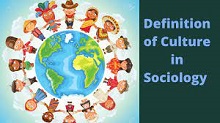Culture- DefinitionSome definitions of culture
Theory of cultural determinismThe theory that human nature is determined by the concepts, meanings, beliefs, and values people learn as members of society. What people learn defines them. Positive interpretations of cultural determinism believe that there are no restrictions on what people can achieve or be. According to some anthropologists, there is no one "correct way" to be a human. The majority of the time, the "right way" is also "our way," and "our way" in one civilization practically never coincides with "our way" in any other society. An enlightened person's sole permissible attitude is one of tolerance. The upbeat form of this idea holds that because human nature is infinitely flexible, individuals can select the lifestyles they prefer. The pessimistic interpretation contends that people are what they are conditioned to be and that they have no control over this. Humans are passive creatures who follow the rules set forth by their culture. This justification leads to behaviourism, which places the origins of human behaviour in a domain that is entirely outside of human control. Cultural relativismDiverse cultural groupings have different ways of being, feeling, and acting. There are no objective criteria that can be used to determine whether one group is inherently superior or inferior to another. The study of cultural differences between people and societies is predicated on a cultural relativism viewpoint. Normalcy neither for oneself nor for one's community is implied. However, it necessitates using discretion while interacting with groups or communities that are dissimilar to one's own. Before making a decision or taking action, one should be informed on the types of cultural differences that exist between societies, their causes, and their effects. When the parties involved comprehend the causes for the differences in opinions, negotiation will be more successful. Cultural ethnocentrismDifferent cultural groups have various modes of existence, emotion, and behaviour. It is impossible to establish whether one group is essentially superior or inferior to another using objective standards. A cultural relativism stance serves as the foundation for the study of cultural variations among individuals and communities. Normalcy is not suggested for oneself or one's community. However, it calls for caution while interacting with cultures or groups that are different from one's own. One should be knowledgeable about the various types of cultural differences that occur among societies, their causes, and their impacts before making a decision or taking action. Negotiation will go more smoothly if all parties involved are aware of what led to the disagreements.:
Manifestations of cultureCultural differences can be seen in a variety of ways and to varying degrees of depth. With heroes and rituals in between, symbols stand for the most surface-level and values for the deepest manifestations of culture.
Layers of cultureEven people from the same culture have multiple layers of internal mental conditioning. The following levels of culture have various layers:
Measuring cultural differencesBoth single-measure and composite-measure procedures can be used to operationalize a variable. A composite-measure strategy uses numerous indicators to build an index for the idea after the concept's domain has been empirically sampled. A single-measure technique uses one indicator to measure the domain of a concept. Hofstede (1997) developed a composite-measure method to assess cultural variances between various nations.:
Reconciliation of cultural differencesAwareness among cultureIt is probably vital to determine any potential cultural differences between one's home nation and the country where business will be conducted before embarking on a global job. Where there are differences, one must assess if and how much domestic procedures can be modified for the foreign setting. The differences are frequently difficult to see or feel. Some cultural distinctions are picked up instinctively, while others are taught purposefully (such as greeting conventions) (e.g. methods of problem solving). The development of cultural awareness may not be simple, but once completed, it undoubtedly aids in getting work done effectively in a foreign environment. Reading about and having discussions about various cultures absolutely contribute to increasing cultural understanding, but ideas expressed must be carefully considered. Sometimes they might be an appraisal of a particular set of people's subgroups, unfounded prejudices, or a predicament that has since undergone significant changes. Always seek out different perspectives on the same society. Clustering culturesSome nations may have numerous characteristics in common that influence their cultures (the modifiers may be language, religion, geographical location, etc.). The data from previous cross-cultural research may be used to classify nations based on shared values and outlooks. Traveling within a cluster is likely to present fewer differences than moving across clusters. Estimating the scope of involvement on a global scaleCultural sensitivity is not a requirement for all multinational businesses. The more a corporation expands beyond its primary function of conducting domestic business, the more cultural sensitivity is required. Building cultural awareness is even more important when we move outward on multiple axes at once.
Next TopicE Commerce Definition
|
 For Videos Join Our Youtube Channel: Join Now
For Videos Join Our Youtube Channel: Join Now
Feedback
- Send your Feedback to [email protected]
Help Others, Please Share










